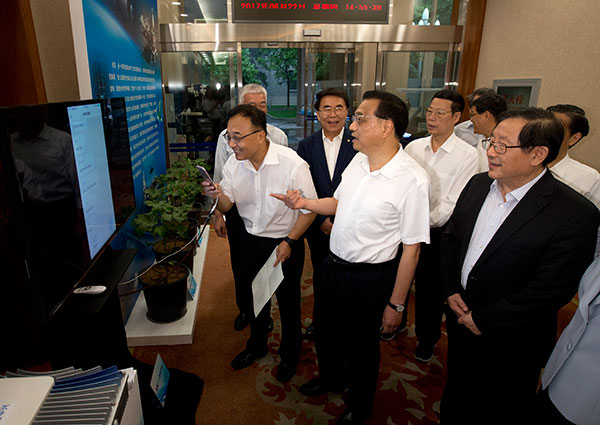


Premier Li Keqiang and other State Council members view a technology achievement exhibition before a State Council study symposium on the new technological and industrial revolution on Thursday at the Zhongnanhai compound in Beijing.[Photo by Feng Yongbin/China Daily]
Premier exhorts nation to embrace scientific advances to spur growth
China is ready to enhance its efforts in fundamental scientific research and seek original breakthroughs to promote innovation-driven development and reach the technological vanguard as a new technological and industrial revolution brings profound changes to the world, Premier Li Keqiang said.
Li made the remark while chairing a study symposium for the State Council on the new technology and industrial revolution at the Zhongnanhai compound in Beijing on Thursday.
Scientists and researchers from the Chinese Academy of Sciences and the University of Science and Technology of China gave briefings on the latest advances in artificial intelligence, quantum physics and genetic editing, raising policy recommendations for each field.
The revolution will reshape the economic and political landscape, rearrange global competitiveness and significantly change existing industries, Li said after hearing the reports. He stressed that China must come up with stronger original research in the above fields.
China must attach importance to innovation capability, upgrading traditional growth engines and fostering new growth drivers to maintain a medium to high pace of growth and achieve a medium to high level of development in the long run, he said, calling for the better integrating of fundamental research and productivity.
Pointing out that the new scientific and technological revolution touches on distinct fields of knowledge whose effects stretch across various subjects, Li said that government officials need to keep themselves informed about various technological advances to improve their policy-making process.
"Government officials must not allow themselves to be blind to technological and scientific advances," Li said.
He emphasized that the government needs to keep innovating and updating related policies so as to be inclusive to new industries while maintaining prudent and compliant supervision and creating a healthy environment for emerging industries.
A report on Global Innovation Index, issued in Geneva on June 15, said that China advanced to No 22 in innovation capability this year, from No 25 in 2016, making the world's second-largest economy the only middle income country among the world's 25 most-innovative economies.
Li said at the symposium that he had noticed that institutional hurdles, such as constrictive research funding regulations, still hinder scientists' efforts to tap the full potential of research.
"Only when we are able to clear away institutional hurdles and make institutional breakthroughs can we truly motivate scientists and unleash their potential, and take initiative in the new technological revolution and industrial transformation," he said.
Bai Chunli, president of the Chinese Academy of Sciences and a leading nano-scientist, and Pan Jianwei, a leading quantum physicist from the Science and Technology University of China, were among the scientists who spoke at the symposium.
Xinhua contributed to this story.
 Fire brigade in Shanghai holds group wedding
Fire brigade in Shanghai holds group wedding Tourists enjoy ice sculptures in Datan Town, north China
Tourists enjoy ice sculptures in Datan Town, north China Sunset scenery of Dayan Pagoda in Xi'an
Sunset scenery of Dayan Pagoda in Xi'an Tourists have fun at scenic spot in Nanlong Town, NW China
Tourists have fun at scenic spot in Nanlong Town, NW China Harbin attracts tourists by making best use of ice in winter
Harbin attracts tourists by making best use of ice in winter In pics: FIS Alpine Ski Women's World Cup Slalom
In pics: FIS Alpine Ski Women's World Cup Slalom Black-necked cranes rest at reservoir in Lhunzhub County, Lhasa
Black-necked cranes rest at reservoir in Lhunzhub County, Lhasa China's FAST telescope will be available to foreign scientists in April
China's FAST telescope will be available to foreign scientists in April "She power" plays indispensable role in poverty alleviation
"She power" plays indispensable role in poverty alleviation Top 10 world news events of People's Daily in 2020
Top 10 world news events of People's Daily in 2020 Top 10 China news events of People's Daily in 2020
Top 10 China news events of People's Daily in 2020 Top 10 media buzzwords of 2020
Top 10 media buzzwords of 2020 Year-ender:10 major tourism stories of 2020
Year-ender:10 major tourism stories of 2020 No interference in Venezuelan issues
No interference in Venezuelan issues
 Biz prepares for trade spat
Biz prepares for trade spat
 Broadcasting Continent
Broadcasting Continent Australia wins Chinese CEOs as US loses
Australia wins Chinese CEOs as US loses